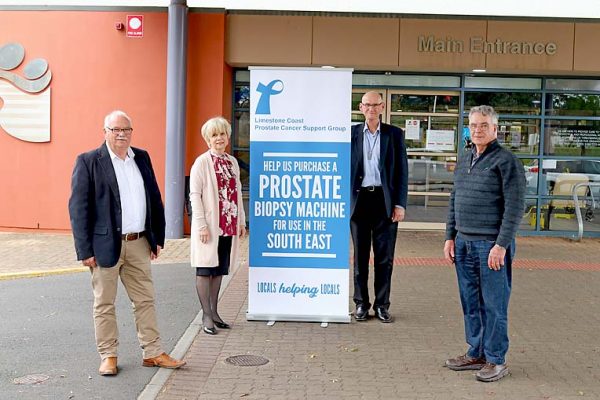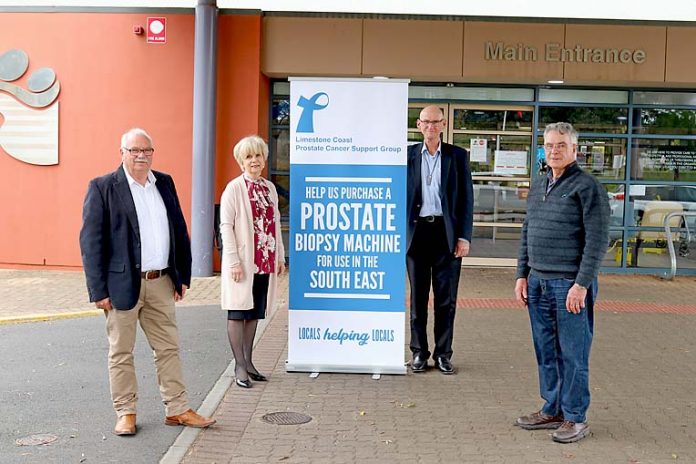
THE LIMESTONE Coast Local Health Network will soon offer state-leading and best practice prostate biopsies to help deliver better diagnosis and treatment outcomes for regional patients.
A community-wide effort has put a transperineal biopsy machine in reach for the health district, with $155,000 of the $207,000 required to purchase the vital medical equipment already raised.
The Limestone Coast Prostate Cancer Support Group has already pledged $65,000 towards the machine, while $30,000 of an expected $60,000 has been donated by prostate cancer research and support organisation The Male Bag Foundation.
The foundation made a $120,000 pledge to support the Limestone Coast and Riverland/Mallee/Coorong health care districts earlier this year after research revealed both areas had alarmingly low prostate cancer survival rates once detected.
Limestone Coast Prostate Cancer Support Group chairman Richard Harry said he joined forces with the foundation after the announcement, becoming a leading ambassador for fundraising in the community.
Mr Harry said the support group’s $65,000 contribution used funds collected through community donations and public events over the years.
“We are incredibly grateful for the community’s contributions over the years,” Mr Harry said.
“We want men living in our country areas to have the same access to what is available to people in the city.”
After speaking with Mr Harry, Mount Gambier City Council, Grant District Council and the Naracoorte Area Health Advisory Council each pledged $10,000 towards the project.
The final goal of $207,000 is expected to be reached by the end of the year.
Grant District Mayor Richard Sage congratulated Mr Harry and the support group on doing a fantastic job of informing the community about prostate cancer, as well as their fundraising efforts.
“It was an initiative which came before council, we discussed it and in a very short space of time we decided to get on board,” Mr Sage said.
“Men can be particularly reluctant to talk about health issues and this topic can sit pretty close to their hearts.”
Mount Gambier Mayor Lynette Martin said the machine would be a tremendous asset for the Limestone Coast, particularly as the technology was mobile.
“It will save patients who require biopsies to travel to Adelaide and they will be able to remain in the region around family and friends during the process,” Ms Martin said.
“It also takes the pressure off the capital city’s health systems with people who are having to travel essentially clogging them up.
“Being as large of a region as we are, we should have the facilities here for our residents.”
Naracoorte Health Advisory Council president Barrie Moyle said the machine was extremely advantageous to the region’s men.
“I have spoken to people who have had previous surgery before this machine technology was in play and they have said it was particularly painful,” he said.
“If they had to drive an hour to Mount Gambier or Millicent to have that use, so be it.”
Mount Gambier Hospital executive director of nursing and midwifery Paul Bullen said the machine offered the best practice available for patients.
“It is something which is currently not offered in country South Australia,” he said.
“Naracoorte, Millicent and surrounding communities will have access to this machine and it will benefit the wider Limestone Coast population.
“We are very excited to be a part of this fundraising opportunity and are looking forward to being able to offer this procedure as close to home through our community.”
Mr Bullen said access to treatment would operate on a referral basis.
“A general practitioner will refer a patient to a urologist to then make the best decision,” he said.
“A patient will be diagnosed by a health professional who will order the test.
“The patient can then come into hospital and have the test performed under anaesthetic.”
With each test taking around an hour, Mr Bullen said the procedure involved an ultrasound-guided needle biopsy of the prostate gland.
“They will be under anaesthetics so they sleep through the procedure and wake up afterwards hopefully experiencing no discomfort,” he said.
“Currently there are alternative measures in place locally which may continue to be pursued by specialists.
“At the moment anybody wanting to access a perineal biopsy would have to travel to Adelaide or Warrnambool.”
Mr Bullen said the treatment was a safer and cleaner way of performing a biopsy.
Wattle Range Council is expected to discuss potential project support at its monthly meeting on May 12.






